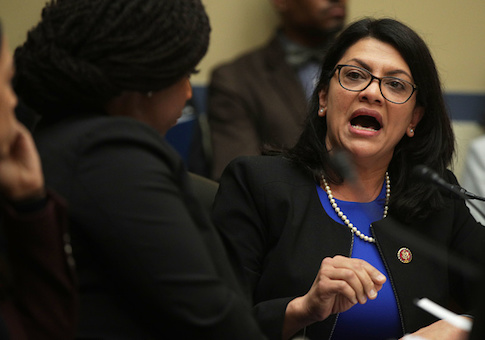Freshman representative Rashida Tlaib (D., Mich.) is spearheading an opposition campaign to the proposed Sprint-T-Mobile merger, according to documents obtained by the Washington Free Beacon.
Rep. Tlaib is circulating a letter on Capitol Hill that will be sent to Federal Communications Commission chairman Ajit Pai and Makan Delrahim, the assistant attorney general in charge of the Justice Department's anti-trust division, urging them to reject proposed merger between the two telecommunication giants. Tlaib urges her partymates to sign on, saying it would "harm American jobs, reduce competition in the already highly concentrated wireless market, and raise prices for consumers." Dozens of Democrats have already signed on to the letter.
"This is a bad deal for the American people," the letter says. "This deal is designed to destroy jobs and drive down wages, hurting American workers and consumers and threatening our economy."
Tlaib did not respond to request for comment.
The email message emphasizes that Tlaib's effort is backed by organized labor. The email closes with bold-faced type saying it is "Supported by the Communication Workers of America (CWA)."
Tlaib defeated a local CWA union president in the Democratic primary during the midterms and did not receive any money from it during the general election, but the CWA has been a major contributor to the Democratic Party in recent years. The union, which represents more than 700,000 workers in the telecomm industry, donated $7.6 million with nearly all of that money used to support Democratic candidates in 2018, according to the Center for Responsive Politics.
CWA has been a vocal critic of the proposed merger, claiming that it would cut 28,000 jobs.
"The merger would result in massive job losses totaling more than 28,000, while offering no countervailing benefits for the public," CWA president Chris Shelton said in August 2018. "Unless the companies make a binding commitment not to eliminate jobs in their proposed merger, to stop violating federal labor laws, and to fully respect workers' rights, the FCC should not approve this merger."
The union has not always been opposed to massive mergers of telecommunication companies. It threw its full support behind the proposed merger of AT&T and Time Warner, saying it "was about maintaining and creating good U.S. jobs and developing new and innovative ways to deliver technology and content." That merger prevailed in federal court despite the objections of the Justice Department about the size and scope of the $85 billion acquisition from America's second largest wireless provider.
Questions have been raised about the potential conflicts of interest in CWA's opposition to the T-Mobile-Sprint merger. As first reported by MLex Market Insight, a regional labor contract between the union and AT&T signed in Dec. 2017—one month after CWA endorsed the Time Warner merger—requires CWA to support its legislative agenda. The proposed merger of T-Mobile and Sprint could provide more market competition to AT&T and industry leader Verizon.
"The Union hereby agrees to continue its support before the appropriate regulatory and legislative bodies for the Company’s efforts to remain competitive in, and/or gain entry to, all telecommunications and related markets," the agreement said. It added that CWA is free to disagree with the company, provided it gives AT&T advanced notice. The company is bound by a similar agreement regarding CWA's political agenda. A union official denied any link between that contract language and its position on the T-Mobile/Sprint merger in a statement to MLink, saying the position was based on the fact that it would bring together "aggressive anti-union companies."
CWA did not return request for comment about its involvement in the letter or its relationship with Tlaib, who has made headlines for statements that critics have called anti-Semitic and for her endorsement of the Boycott, Divestment, and Sanctions movement against Israel.
